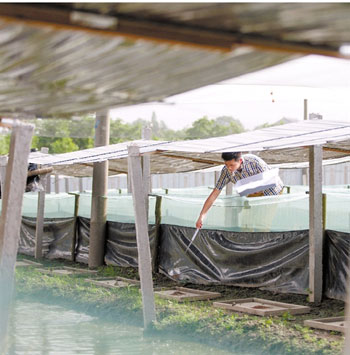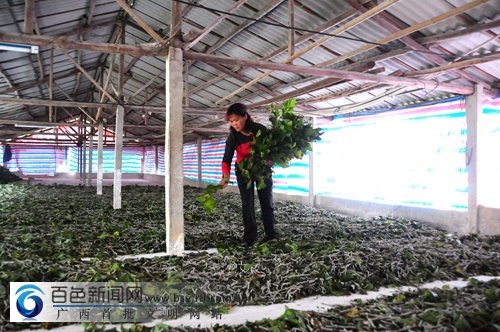The boss of the chemical industry raised a frog by playing in the mud rice field.

Wu Chuanyi feeds the black spot frog.
In Chengshan Village, Heping Town, Changxing County, Wu Chuanyi, a frog breeder in his 30s, squatted down in the mud next to a frog pond. As soon as he lifted a plank, dozens of frogs jumped out and got into the ditch next to him. After "plop" and "plop" a few times, the frogs of more than ten meters around all followed the commotion.
Wu Chuanyi is not tall, wearing a clean shirt and no mud, making it difficult to associate him with traditional farmers. But looking at the way he feeds, he is very sophisticated.
Wu Chuanyi did not know how many frogs he had, but only said that there were two plots of land, one 80 mu and one 120 mu. The two farms belong to Zhejiang Changxing Creative Ecological Agriculture Development Co., Ltd., located in Chengshan Village, Heping Town, Changxing, Huzhou, about 5 kilometers apart. Wu Chuanyi's daily work is to drive back and forth between the two places, presiding over the work of the farm.
"in recent years, the business of chemical plants has become more and more difficult and polluting, and black spot frogs can catch a large number of pests, and the economic benefits are better than ordinary bullfrogs and American frogs." Wu Chuanyi talked about the original intention of raising frogs in this way. In 2010, he gave up one of his chemical plants and hundreds of thousands of annual returns to return to his hometown to develop aquaculture, and later began to plant "frog rice fields."
In order to learn the technology, Wu Chuanyi learned about the ways of raising frogs from the Internet, television and other channels, and personally went to Sichuan, Hunan, Jiangsu and other places to inspect. Through continuous exploration, he slowly found the way, explored advanced and scientific culture methods such as live water hatching, tadpole adult frog stocking in the same pond, efficient artificial domestication and feeding pellet feed, and made a reasonable plan for the culture base. it is divided into living water hatching area, frog seedling hatching area and other different areas.
After several years of groping, Wu Chuanyi's green industry has developed rapidly. In 2013, the yield of frogs per mu in the breeding base reached 30,000 yuan, and Chengshan Village became a veritable frog village.
In one of Wu Chuanyi's farms, we saw that in addition to the hatching area, there was a rice field of about 20 mu, which was the "frog rice field" that Wu Chuanyi began to experiment with in May this year.
From the outside, the "frog rice field" is no different from the ordinary farmland, but with more than one ditch, the frog is hidden in the water, and the rice field is surrounded by a net more than half a meter high. Above the rice field, four or five meters high, there is a larger net, covering the entire 120 mu farm, forming a relatively closed space.
Rice raising frog, frog protecting rice, the way of interbreeding has formed a small-scale ecological balance. In addition to some biological pesticides that have to be used, "frog rice fields" eliminate all conventional pesticides; in addition, rice fields do not use too many fertilizers, mainly biological fertilizers, so as to achieve ecological protection as far as possible and improve the quality of rice.
At present, half of the "frog rice" in the experimental field has been harvested, and the other half will be harvested before the end of the month. In terms of yield per mu, rice weighs more than 700 jin and black spot frog more than 500 jin. Compared with growing rice or raising frogs alone, this yield is relatively small, but in terms of comprehensive benefits, this form far exceeds traditional agriculture, and it is expected that the benefit of per mu yield will be close to 20,000 yuan. "the most important thing is that after the introduction to the market, the concept of 'frog rice' will be very popular." Like just starting a business, Wu Chuanyi is full of confidence in his green industry.
On the way back, Wu Chuanyi received a phone call. A farmer in the village called and asked him to impart his experience. Putting down the phone, Wu Chuanyi told reporters that his greatest wish now is to optimize his model of raising frogs and growing rice to make it simpler and more efficient, so as to drive more farmers to become rich.
- Prev

Qingfeng, Henan: eating chrysanthemums fulfills farmers' dream of becoming rich
Qingfeng, Henan: eating chrysanthemums fulfills farmers' dream of becoming rich
- Next

Li Haiping, an expert at getting rich in Baise science and technology.
Li Haiping, an expert at getting rich in Baise science and technology.
Related
- A course of planting techniques and methods on how to grow carrots
- How to plant the latest tulips?
- Is it better to pick tea in the morning or in the afternoon? When is the best time for tea to be picked? what is the third or fifth tea?
- Launch Yuanxiao Happy combination Haocha + Tea Yuan healthy Taste
- Penghu Tourism "Fireworks 20 Parade with You"
- 2022 West Lake Happiness holds "Digital Revitalization Voucher" and draws iphone13 and laptop.
- Banqiao Fuzhou social houses are designed to change start-up combined with police elimination to create a safe and livable environment
- The convenient measure of "mechanical weeding" in Xinbei has been abused and the Agriculture Bureau has imposed heavy penalties on the illegal land consolidation.
- Changgeng University Joins Hands with Four Memory Factories to Rescue Memory Talent Shortage
- The list of Taiwan's top 100 MVP managers is listed by the Director-General of the Farmers' Association of Sanxia District.

